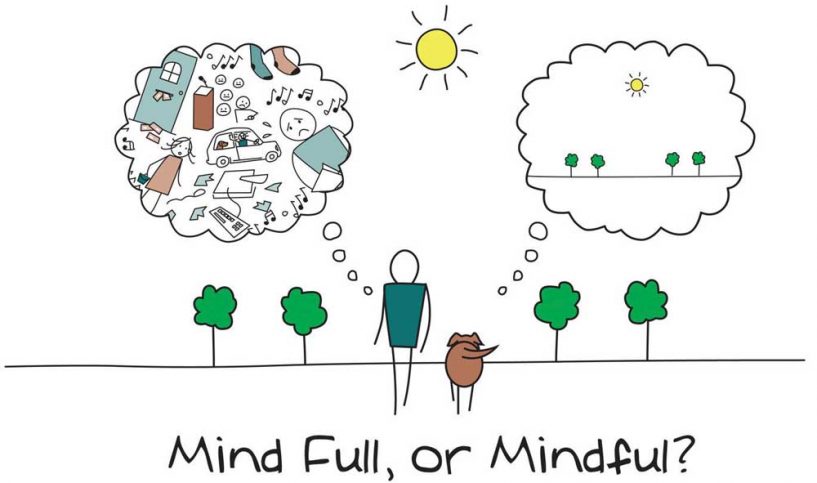Unless you’ve been hiding under a rock, living in splendid isolation in the Back-of-Beyond, or making a living playing video games, “mindfulness” will have impinged on your consciousness somehow. Maybe at this point you’ve already rolled your eyes and prepared to move on to the next page of this groovy magazine.
Stop!
No, really.
Stop. Don’t turn that page.
Mindfulness is not just a trend that will pass out of favor in a month or two, nor is it a trendy word to describe something bohemian or airy-fairy that only upcycled hippies do after hot yoga.* There’s some really awesome science behind the practice of mindfulness, and the fact that it’s become a buzzword used by everyone and the neighbor’s dog ought not take away from the value of the practice itself. (I don’t know about you, but talking dogs get MY attention)
Mindfulness is first and foremost the discipline of giving attention to what is, now; right now, at this convergence of time and space and presence. It’s something we ‘higher order sentient beings’ are incredibly bad at. In fact, we’re the worst at being present in the moment; connected body, heart, and mind. The majority of us live on autopilot, navigating our current activity/space with mind and psyche reliving the past (negative or positive) or anticipating the future (negative or positive) and experiencing the emotional fallout in the present.
Newsflash!
This is not living. This is existing. (What is catastrophizing but mentally predicting a future you don’t want and freaking out about it now?) Living requires presence. The thing is, sometimes (often) the present is emotionally uncomfortable. We must face something we’ve been avoiding; acknowledge a reality we don’t like; admit a truth we’d rather not; or just be quiet in a noisy, chaotic world. Most of us are not good at simply being.
Mindfulness is a discipline. It is a habit of mind that must be cultivated, practiced, nurtured, and continued. There are numerous ways to develop a quiet mind, and a quick Google search will pitch up a number of options for you to choose from. What I actually wanted to emphasize here are the reasons to develop a habit of mindfulness. There are many studies that support this practice, and the positive benefits are well documented. Here’s a short list, by no means complete, but certainly enough to get you thinking about why it might be a good idea to pursue this practice.
- Reduced rumination. This is a fancy-schmancy way of saying less time spent thinking the same thought (or set of thoughts) over and over and over. Rumination is a cognitive rut that causes anxiety, increases stress, and often leads to avoidance behaviors. (Our thinking habits have a profound impact on our behavior)
- Stress reduction. It shouldn’t be surprising that purposefully taking time to be quiet reduces the amount of stress we feel. Not only does the habit of mindfulness reduce the stress we feel, it also reduces the physiological impact of stress. Blood pressure is reduced, heart rate drops, and the physical discomfort of stress (aches, pains, skin prickling, tension headaches etc.) is lessened.
- Increases working memory. Remember, I’m offering benefits that peer-reviewed, double-blind, replicated scientific studies have uncovered. When we choose to practice mindfulness regularly, the working part of our brain is refreshed, and the positive effect is a better memory. Who doesn’t want that?
- Emotional stability. People who practice mindfulness are less likely to experience emotional reactivity – in other words, even in stressful situations, they are able to manage their emotions and choose a response rather than merely reacting. The difference in outcome between responding and reacting can be HUGE.
- Mental flexibility. In order to be creative, we must have space to consider the problem at hand, its scope, and implications of any possible solutions. When our minds are stretched to capacity by everyday junk thoughts, creativity suffers. Mindfulness measurably increases creative capability.
- Relationship dividends. It logically follows that if I, as part of a relationship, am fully present for the other, communication will be more satisfying, there will be less misunderstandings, and with the increased mental flexibility that mindfulness promotes, I’ll be able to be creative about resolving conflict.
There are too many benefits to fit in this article, but the few I’ve chosen to list should make it evident that mindfulness is a worthwhile effort. As with anything worth having, it takes a conscious choice and continued investment to create a practice of being present that will bring these benefits to fruition in your life.
I started small – not being given to quietness in anything – by doing Zentangles to learn what it felt like to have a quiet mind. From there, I tried a few different forms of mindfulness (having visited Google) until I found one that felt ‘right.’ Why not do the same? Try it consistently for 30 days. I’m confident the positive benefits will be enough encouragement to continue. The habit of mindfulness is a simple, doable way of increasing quality of life.
* ‘Mindfulness’ is, of course, a form of meditation… that’s been around for millennia.











